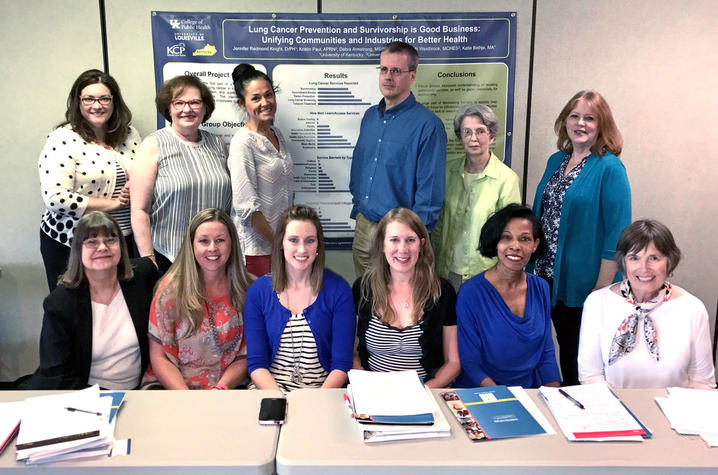Employers Key to Addressing Lung Cancer Disparity in Rural Kentucky
LEXINGTON, Ky. (Dec. 18, 2019) — Lung cancer is the leading cause of cancer deaths among all Kentuckians. Male Kentuckians have higher rates than females, with a disproportionate number residing in rural and medically underserved parts of the state.
According to a University of Kentucky study, worksite intervention may be key to connecting men in rural Kentucky with critical lung cancer prevention and control resources and services. A UK-led coalition is partnering with employers in Southern Kentucky to address this health disparity.
The UK College of Public Health, in coordination with the Kentucky Cancer Program at UK and the University of Louisville and the Kentucky Cancer Consortium, have created a worksite intervention on lung cancer, which targets work sites with predominantly male employees in eight rural and medically underserved counties in southern Kentucky. The counties include: Casey, Christian, Clay, Jackson, McCracken, Ohio, Perry and Warren.
The coalition was created in 2016, when the Centers for Disease Control and Prevention (CDC) designated a coalition based at the UK College of Public Health as a member of the SelfMade Health Network, a national network of dedicated professionals, organizations and communities seeking to eliminate tobacco-related health disparities in underserved or high-risk populations.
The first phase of funded research, which was recently published in the American Journal of Men’s Health, included focus groups with community organizations in order to understand the resources and services available in each county, such as tobacco treatment, lung cancer screenings, smoke-free workplace policies and radon prevention.
“What we learned is that employers may be an effective way to reach men in rural Kentucky,” said Jennifer Knight, an assistant professor in the UK College of Public Health Department of Health Management and Policy and principal investigator on the project. “Another important takeaway is community organizations and area employers are very interested in developing partnerships with one another.”
While the first research phase was focused on how to create the partnerships, Knight says the coalition is now coordinating the worksite intervention.
After holding informational roundtables with work sites in each county, the group developed a resource kit for employers, who are currently testing them.
“When we take the time to do this kind of research in communities, we can learn a lot about what is needed and how we can contribute to improving the health of our communities,” Knight said.
As the state’s flagship, land-grant institution, the University of Kentucky exists to advance the Commonwealth. We do that by preparing the next generation of leaders — placing students at the heart of everything we do — and transforming the lives of Kentuckians through education, research and creative work, service and health care. We pride ourselves on being a catalyst for breakthroughs and a force for healing, a place where ingenuity unfolds. It's all made possible by our people — visionaries, disruptors and pioneers — who make up 200 academic programs, a $476.5 million research and development enterprise and a world-class medical center, all on one campus.






